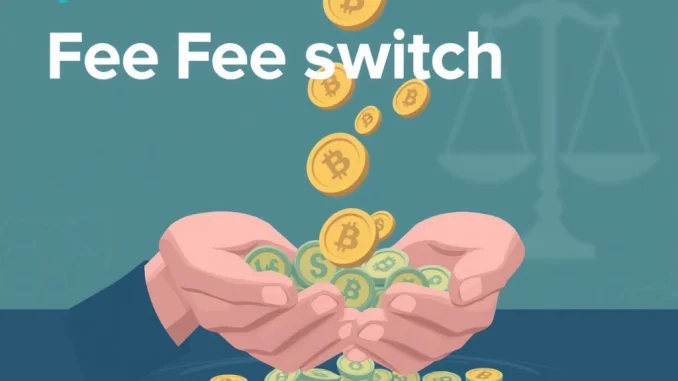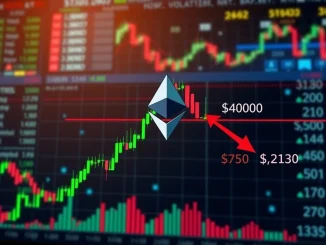
Big news is stirring in the world of decentralized finance (DeFi). The Uniswap Foundation, the entity supporting the Uniswap protocol’s growth, is reportedly taking another look at a significant proposal concerning its fee distribution policy. This development could have major implications, particularly for those holding the native UNI token.
What is the Uniswap Fee Switch and Why Does it Matter?
At its core, the Uniswap fee switch is a mechanism built into the protocol that allows a portion of the transaction fees generated by trading activities on Uniswap to be directed to UNI token holders who have staked their tokens or participated in governance. Currently, 100% of the fees go to liquidity providers.
Why is this important? For many token holders, the prospect of earning a direct yield from the protocol’s success is a key factor in their investment and participation. Implementing the fee switch could potentially:
- Increase the intrinsic value of the UNI token by providing a direct revenue stream.
- Incentivize long-term holding and staking of UNI.
- Further decentralize control by rewarding active community members.
This isn’t the first time the idea has surfaced. A proposal to activate the switch was put forward previously but was withdrawn.
Could UNI Token Holders Finally Earn Fees?
According to reports from DL News, the Uniswap Foundation is now revisiting this previously shelved proposal. Abdullah Umar, a member of the Uniswap DAO’s accountability committee, indicated that a new vote on the proposal could occur as early as mid-summer. If the community governance process approves it, a share of the transaction fees could indeed start flowing to eligible UNI token holders.
This reconsideration is a significant development. It signals a potential shift in how the value generated by one of DeFi’s largest protocols is distributed, moving towards directly benefiting those who hold and participate in governing it.
The Alleged Role of Crypto VC Influence
The history of the fee switch proposal includes a notable point of controversy. Dan Robinson, a general partner at the prominent Crypto VC firm Paradigm, made a public claim last year regarding the withdrawal of the initial fee switch vote. Robinson stated that an unnamed large Crypto VC firm allegedly pressured the Uniswap Foundation to pull the proposal at that time.
This claim highlights a recurring tension within the DeFi space: the balance between decentralized governance and the influence of large, centralized entities like venture capital firms who often hold significant token allocations. While VCs provide crucial early funding and support, their influence on governance decisions can sometimes conflict with the broader community’s interests or the ethos of decentralization.
The fact that the Uniswap Foundation is now bringing the proposal back suggests either that the alleged pressure has lessened, or the foundation and the DAO are determined to let the community decide, regardless of external influence.
Navigating DeFi Governance and the Uniswap Foundation
The process of activating the Uniswap fee switch involves the protocol’s decentralized autonomous organization (DAO). This means that any proposal must go through a community governance process, typically involving proposal submissions, discussion, temperature checks, and finally, on-chain voting by UNI token holders.
The Uniswap Foundation plays a key role in bootstrapping the ecosystem and facilitating governance processes, but the ultimate decision-making power rests with the DAO and its token holders. The reconsideration by the foundation is a necessary step to bring the proposal back before the community for a vote.
Challenges in this process include:
- Ensuring broad community awareness and participation in the vote.
- Addressing potential concerns about regulatory implications of distributing fees.
- Balancing the interests of liquidity providers (who currently receive all fees) and token holders.
What’s Next for the Uniswap Fee Switch Proposal?
All eyes will now be on the Uniswap Foundation and the DAO as they prepare for a potential new vote. If Abdullah Umar’s timeline is accurate, we could see the proposal formally put to the community sometime in the next few months.
For UNI token holders and observers of DeFi governance, this is a critical period. The outcome of the vote will not only impact the token’s economics but also set a precedent for how major DeFi protocols can evolve and how the influence of entities like Crypto VC firms is navigated within decentralized structures.
Stay tuned for further updates as the situation develops. The path forward for the Uniswap fee switch is a key story in the ongoing evolution of decentralized finance.
Summary: A Pivotal Moment for UNI Holders
The reconsideration of the Uniswap fee switch proposal by the Uniswap Foundation marks a potentially pivotal moment for the protocol and its UNI token holders. If passed by the DAO, the proposal would allow token holders to receive a share of transaction fees, potentially increasing the token’s value and incentivizing participation. Despite past controversies, including alleged pressure from a large Crypto VC, the proposal is back on the table, with a potential vote happening as early as mid-summer. This development underscores the dynamic nature of DeFi governance and the ongoing efforts to align incentives within decentralized ecosystems.



